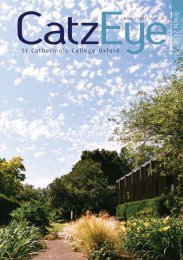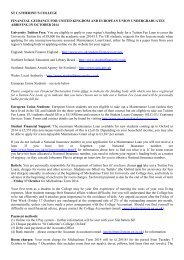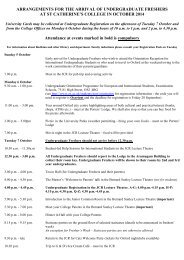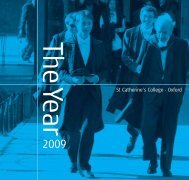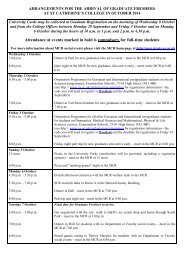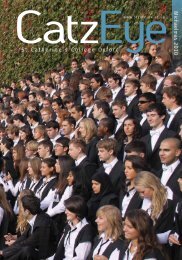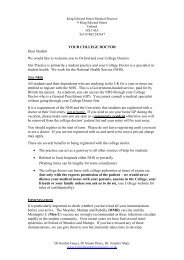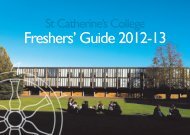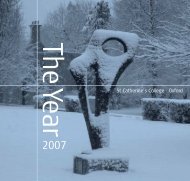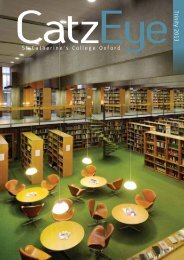Download PDF - St. Catherine's College
Download PDF - St. Catherine's College
Download PDF - St. Catherine's College
- No tags were found...
Create successful ePaper yourself
Turn your PDF publications into a flip-book with our unique Google optimized e-Paper software.
CATZ FELLOW<strong>St</strong>he idea that we can learn simply by observing,by the fact that we can know so much about placesin the universe that we have never visited. I had atelescope when I was a teenager, and spent many coldnights outside admiring craters on the Moon, the ringsof Saturn and the moons of Jupiter. My fascination withwhat we do know has since grown into a deep interestin what, through new research, we might yet discoverabout the universe.What can astronomy tell us?Astronomy is a subject that pushes against theboundaries of what we know about the fundamentalbuilding blocks of the universe. It asks big questions,is culturally enriching, and helps people understandtheir planet’s relationship with the rest of the universe.Your subject is not a commercial one. Have there,however, been any practical spin-offs fromastronomical research?Perhaps the most obvious spin-off is in the areaof digital imagery. The push to make very sensitivecameras for astronomical use led to the developmentof the digital cameras that we all now use. There havebeen a number of spin-offs from space programmestoo: the lap-top computers that so many of us rely ontoday have evolved from the microcomputers developedfor the space programme. Surprisingly, even the coatingon non-stick pans is a by-product of technologydeveloped for the Apollo moon landings.Astronomyis a subjectthat pushesagainst theboundariesof what weknow about thefundamentalbuilding blocksof the universe.Background image:Hubble Ultra Deep Field–Photo taken with theHubble Space Telescopeusing the AdvancedCamera SurveysWhat is it like to be an astronomer today?Like many other professional astronomers I spenda large amount of time teaching, in addition toconducting my own research, working with graduatestudents and postdoctoral Research Fellows andobserving with telescopes overseas. One of thethings that I love about astronomy is that it issuch an international subject. I especially enjoythe opportunities that I have to discuss myresearch with colleagues from around the worldat international conferences.Are you worried about the future of astronomy?There is much talk in the media at the moment about ageneral decline in the popularity of science, and physicsin particular, in British schools. I think that the problemis not that children are not interested – boys and girlsof seven and eight are still fascinated by dinosaursand the solar system – but that their enthusiasm isnot translated into a love of physics and maths, thetwo subjects that underpin our knowledge of howthe universe works. Physics is perceived as a difficultsubject, and work needs to be done to overcomethis perception. I enjoy giving public talks and havebeen involved in several outreach projects, includingopen nights at telescopes in Australia, and hope tobe involved in similar projects in Oxford. I remainoptimistic about the future of physics and, especially,astronomy, and believe that the current situation willresolve itself.ST CATHERINE’S COLLEGE 2008/47



